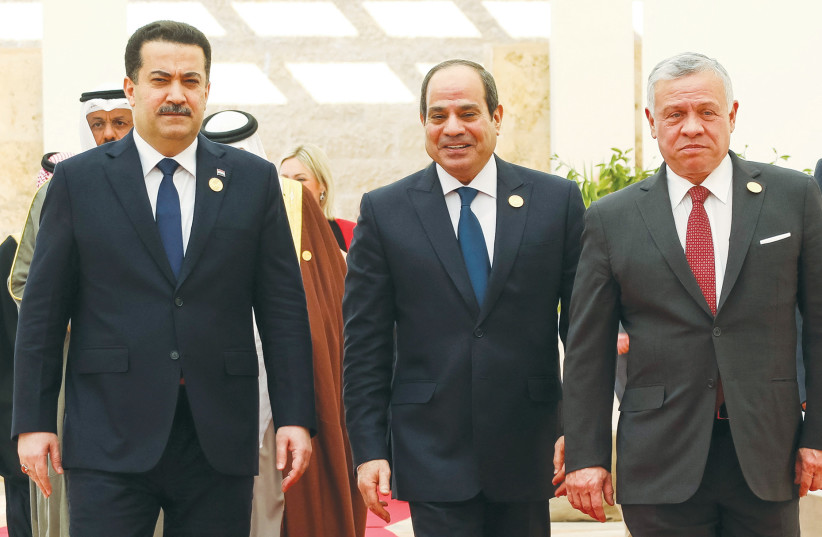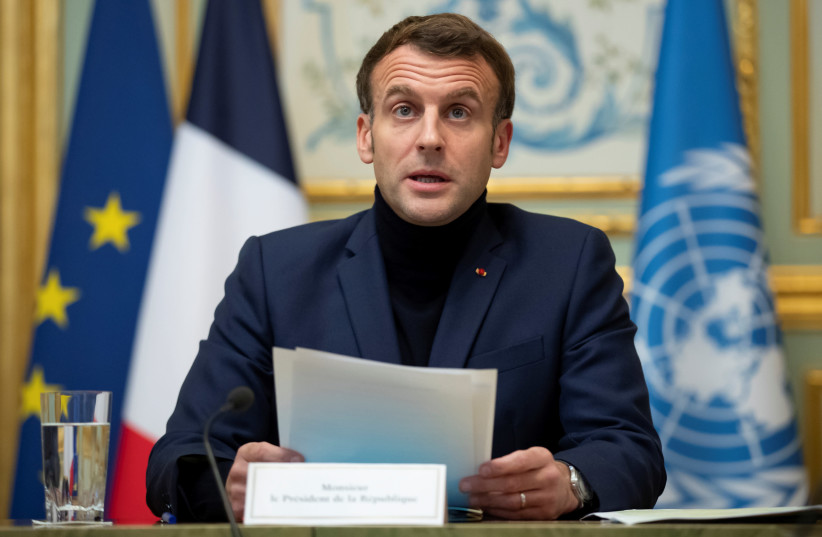by Dore Gold
If Middle Eastern states can block Tehran from using Jordan as a route, they can assure the security of the region. But it is not clear at this stage that they will be able to achieve this goal.
 |
LEFT TO RIGHT: Iraq’s Prime Minister Mohammed Shia al-Sudani,
Egypt’s President Abdel Fattah al-Sisi and Jordan’s King Abdullah II
arrive at the second Baghdad Conference for Cooperation and Partnership,
at the Dead Sea, Jordan last week.
(photo credit: REUTERS/ALAA AL SUKHNI)
|
Occasionally there are events transpiring in the Middle East that indicate how the region has been transformed. Last week, the major players in the core of the Middle East convened for what came to be known as the Baghdad II Conference. The first version of this conference was convened in Iraq in August 2021.
The idea has been put forward that to advance regional stability the parties to a new regional conference need to have their ambitions for regional hegemony addressed – that means drawing in first and foremost Ankara and Tehran. It was still called the Baghdad Conference for Cooperation and Partnership.
What stood out this time was the location of where it was held. The conference was not convened in Baghdad or any place on Iraqi soil. It was in fact convened in Jordan along the shores of the Dead Sea. Iranian President Ebrahim Raisi was supposed to attend, just a stone’s throw away from Israel. In the end, Iran dispatched Foreign Minister Hossein Amir-Abdollahian instead.
Turkey sent only a representative at ambassadorial rank. Had Raisi shown up, the entire conference would have looked like a meeting that was plainly in the shadow of Iranian hegemony.
What was the goal?
Perhaps there was some hope of “tearing Iraq away from Iranian influence,” as one Arab weekly put it. That was not going to happen. True, the attendees included an impressive list of Arab leaders from Jordan, Iraq, Egypt and Kuwait. French President Emmanuel Macron also took part. The indefatigable Josep Borrell, the EU High Representative for Foreign Affairs, apparently was exploring how to renew the Western talks with Iran over its nuclear program.

Dr. Ebtisam Al-Ketbi, who heads the leading research center in Abu Dhabi, the Emirates Policy Center, pointed out that the overlapping crises afflicting the Middle East have made strictly bilateral solutions completely ineffective, which drew the major players in the region to try the Baghdad II mechanism. Perhaps they were thinking about a Middle Eastern version of the Helsinki Process that drew in members of NATO and the Warsaw Pact in 1975 at the height of the Cold War.
But Iran was glued to a policy of exploiting its Islamic Revolutionary Guard (IRGC) units as its chosen instrument for spreading its regional influence – not multilateral mechanisms that the strongest party in the room was prepared to ignore. Over the last few years, Iran effectively employed its Houthi allies in Yemen to successfully strike the heart of Riyadh, shutting down for a period of time a significant percentage of Saudi Arabia’s oil production.
Indeed, a Houthi drone attack knocked out half of Saudi Arabia’s oil production in 2019. Iran did not pay a price for this bold action. Clearly, it had little incentive to restrict its behavior, given the tepid regional reaction. In fact, Jordan’s King Abdullah disclosed on CNN in July 2021 that Iranian drones had attacked Jordanian territory in increasing numbers.
For years, Tehran had built up a military presence in Lebanon and Syria. Now, Iran had been showing its interest in spreading its influence into Jordan as well. Jordan was known to be the locale of a number of Islamic holy sites that were significant to both Sunni and Shi’ite Islam. Iran sought to expand its tourism in Jordan to these areas. Some had been battlefields for early Islamic armies when they had their first military engagements with the Byzantine Empire. They were located near what is today the Saudi-Jordanian border.
Some Middle Eastern leaders hoped that today the Iranians could be placated. That might have been another reason to invite the Iranian president to the shores of the Dead Sea in Jordan. Israel will have to monitor very carefully what is happening with its eastern neighbors – both Iraq and Jordan. Israel has intercepted convoys of weaponry crossing from the Iranian border, by land, to Syria and Lebanon.
It is logical that Tehran redirects its efforts to create an alternative route via Jordan. If Middle Eastern states can block this axis as well, they can assure the security of the region. But it is not clear at this stage that they will be able to achieve this goal.
Dore Gold served as Israel’s ambassador to the United Nations and as
director-general of the Foreign Ministry. Until last month, he was
president of the Jerusalem Center for Public Affairs.
Source: https://www.jpost.com/opinion/article-726166
No comments:
Post a Comment